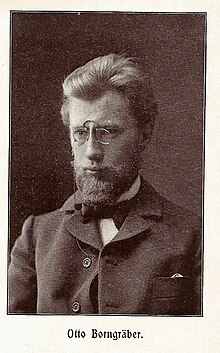Otto Borngräber
Otto Borngräber (born November 19, 1874 in Stendal , † October 19, 1916 in Lugano ) was a German writer .
Life
Otto Borngräber was born on November 19, 1874 in Stendal in the Altmark . His parents were the elementary school teacher Wilhelm and Flora Borngräber. After graduating from high school, he began to study theology and philosophy in Tübingen in the summer of 1896. In 1898 he studied for a short time at the University of Halle , but continued his studies in Marburg that same year. Two years later he returned to the University of Halle.
Borngräber received his doctorate in 1908. His dissertation dealt with "the awakening of philosophical speculation during the Reformation period ". In the same year he worked for a short time as a dramaturge at the New Theater Berlin . On July 10, 1911 Borngräber married the writer Gertrud von Schlieben , who was known under the pseudonym "Gerda von Robertus". After two years, the marriage was divorced. His drama The First People was banned in Bavaria in 1912. Since that time he became friends with the settlers from Monte Verità near Ascona, in particular with the dance poet Rudolf von Laban .
Borngräber was a member of the German Monist Association . When nationalist tendencies flared up there in 1915, he did not hold back with his criticism and wrote an appeal for peace to the peoples and a world peace drama .
Otto Borngräber died at the age of 42 on October 19, 1916 in Lugano.
Works
Stage works
- 1900: Giordano Bruno - A tragedy and overture for the new era
- 1905: König Friedwahn - Germanic tragedy in five acts
- 1907: The ten holy commandments of the free - tragedy
- 1908: The First People - Erotic Mystery in Two Acts
- 1912: Althäa and her child - tragedy in one prelude and four acts
- 1914: The Other Night - Mystery of Love
- 1916: Weltfriedensdrama - Ein Weihespiel
Philosophical writings
- 1903: God-free Christianity
- 1908: The awakening of the philosophical speculation of the Reformation period in its gradual progression
- 1909: God-free humanity
- 1916: Peace appeal to the peoples (with Georg Brandes )
Poetry
- 1900: In forest and wave and heather
- 1903: New poems
- 1915: The hymns to greatness and deep suffering
reception
On Monte Verità in 1917 a three-part dance drama entitled Sang an die Sonne based on a text by Otto Borngräber was performed. Marcel Janco designed masks and costumes . Borngräber also took part in the call for the "Vegetarian-Social Congress", which took place in April 1916 on the "Truth Mountain". This conference - which was intended as a demonstration for peace and against capitalism - was chaired by the Tolstoi friend Paul Birukoff . Borngräber's drama The First People lives on in the opera of the same name by Rudi Stephan (1920), which is still performed today.
literature
- Karl Arthur Schmidt: Otto Borngräber. The modern poet . New life, Berlin 1913
- Romain Rolland : Between the Peoples. Records and documents from 1914–1919 . Volume 1. DVA, Stuttgart 1954, pp. 326-331
- Rudolf Steiner : "The New Century". A tragedy by Otto Borngräber . In: Magazin für Literatur 1900, Vol. 69, No. 24, 28, 29 (GA 29, pp. 385-392).
Web links
- Literature by and about Otto Borngräber in the catalog of the German National Library
- Otto Borngräber , information on the website monteverita.net
Individual evidence
- ↑ See the appeal Congrès végétarien social .
| personal data | |
|---|---|
| SURNAME | Borngräber, Otto |
| BRIEF DESCRIPTION | German writer |
| DATE OF BIRTH | November 19, 1874 |
| PLACE OF BIRTH | Stendal |
| DATE OF DEATH | October 19, 1916 |
| Place of death | Lugano |
